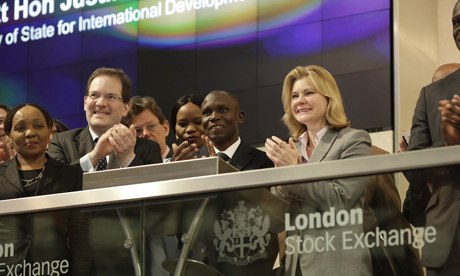
Britain is to spend £1.8bn on the economic development of poor countries next year, more than double the amount spent in 2012-13, the international development secretary announced as part of a "radical shift" in policy that focuses on making it easier to do business in these states.
In a speech at the London Stock Exchange (LSE), Justine Greening said the Department for International Development (DfID) would continue with traditional aid programmes – helping more children into schools, dealing with disease and providing disaster relief – but would shift future resources towards economic development, concentrating on economic growth and jobs.
In 2012, UK aid came to £8.7bn or 0.56% of GNI, an increase of £137m (2%) on 2011 levels. The new direction, announced last year at the same venue, but fleshed out on Monday, will include the appointment of DfID's first director-general for economic development.
"Economic development is not a completely new direction for DfID, but in the past the approach was ad hoc, and nowhere near a top priority for the department. That is changing," Greening said. "We are now building the most coherent, focused and ambitious approach to economic development that DfID has ever had … we are working more closely across government to ensure a coherent UK approach to economic development in new markets."
The shift in focus means DfID's economic development role will concentrate on making it easier to do business in developing countries, including removing barriers to female entrepreneurs.
Greening said: "This approach recognises that businesses are crucial to a country's development … That they bring vital investment, taxes and innovation … And they provide jobs and economic opportunities for the communities where they operate.
"But too often … we see businesses put off from investing in frontier economies because it is seen as too risky. Poor infrastructure, poor regulation, information gaps and financial challenges. These tip the balance away from investment. So DfID is now working harder to remove these obstacles."
As an example of what she called smart aid, Greening cited DfID's recent co-investments with commercial and not-for-profit partners in four business projects, including new tea and rice plantations, in Tanzania.
"This is a totally new way of using our development budget because we're using returnable loans and equity, rather than traditional aid grants," she said. "In short, if these businesses are successful and make a profit, the money will be returned and redeployed, multiplying the development impact. We're sharing the risks, as well as the rewards of investing in business ventures … I want this to be a major part of how DfID works in the future."
In other cases of where DfID is working to improve the climate for business, it has provided technical assistance to Nigeria to help increase the country's power supply, helped cut down the number of days it takes to register a business to three from 57 in Bangladesh and is working to modernise Mombasa, east Africa's largest port.
To improve the working of capital markets in east Africa, DfID announced a partnership with the LSE group to provide training for financial sector executives, regulators and government officials. Twenty capital market executives from Tanzania, who were at the stock exchange on Sunday, were among the first to take part in the training scheme, which is to be replicated across east Africa and beyond.
Last year, DfiD announced four major projects in which "economic growth and poverty reduction are inextricably linked", Greening said. "The key is making sure once growth happens it lifts the maximum number of people out of poverty and that is precisely the focus of what our economic development strategy is looking at."
Development experts have expressed concern that recent high rates of economic growth in Africa have yet to deliver gains in poverty reduction. The UN said in a report last week that robust growth in Africa, driven mainly by production and export of commodities, was failing to translate into job creation and the broad-based development needed to reduce high poverty and rising inequality rates in many countries.
Ben Jackson, chief executive of Bond, an umbrella group of British NGOs, agreed there was a need to refocus on economic issues such as trade and financial flows, but said the important point was whether the creation of wealth and livelihoods would effectively benefit the largest numbers of people.
The UK aid watchdog, Icai, recently urged DfID to do more to ensure that its aid projects to boost trade in developing countries were helping – and not hurting – poor people. The criticism came in connection with the TradeMark Southern Africa (TMSA) programme, a flagship development initiative, which is being shut down.
Mindful that the emphasis on economic development, the business climate in poor countries and jobs, may not go down well with NGOs, Greening challenged them to work with DfID. "They've got a role in this because of their expertise too. They can make sure that when growth happens, it's inclusive," she said. "I want them to join in this economic development approach we're taking."

